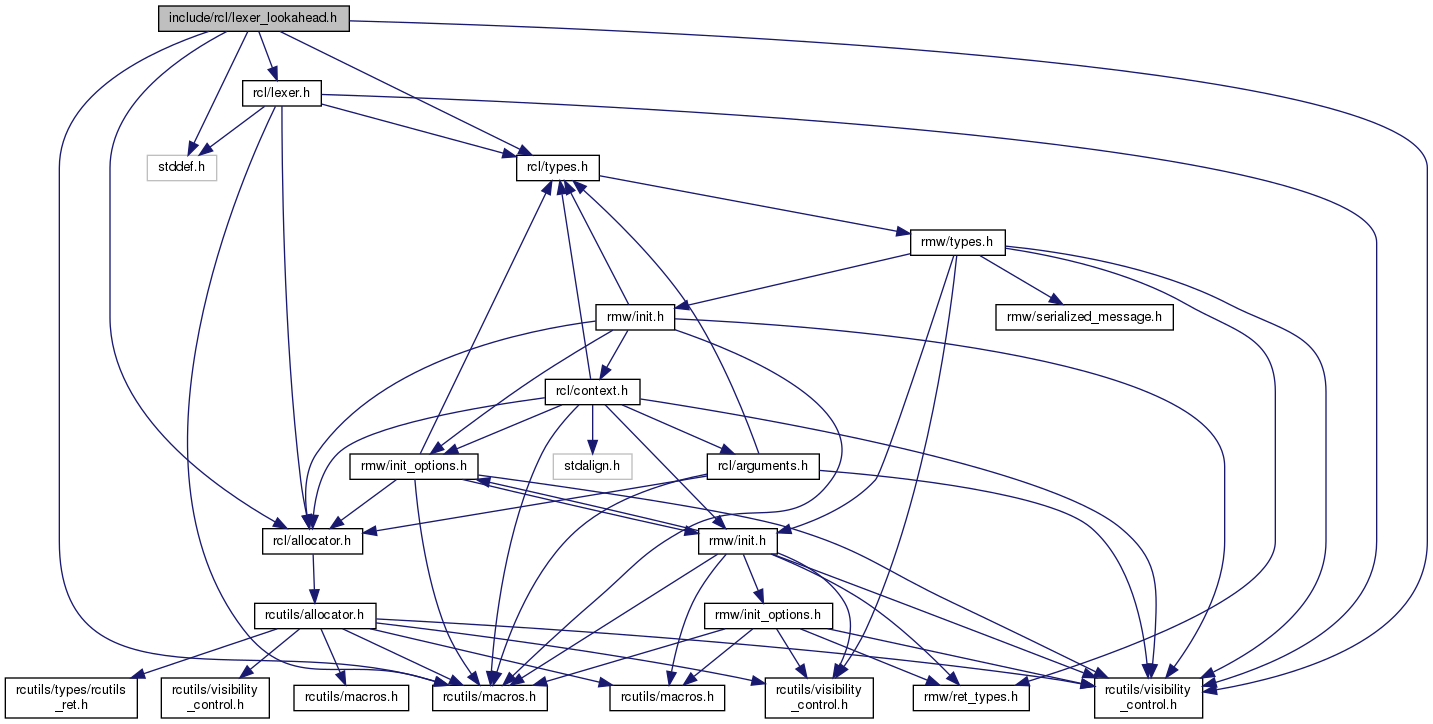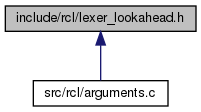#include <stddef.h>#include "rcl/allocator.h"#include "rcl/lexer.h"#include "rcl/macros.h"#include "rcl/types.h"#include "rcl/visibility_control.h"

Go to the source code of this file.
Classes | |
| struct | rcl_lexer_lookahead2_t |
| Track lexical analysis and allow looking ahead 2 lexemes. More... | |
Typedefs | |
| typedef struct rcl_lexer_lookahead2_t | rcl_lexer_lookahead2_t |
| Track lexical analysis and allow looking ahead 2 lexemes. More... | |
Functions | |
| rcl_lexer_lookahead2_t | rcl_get_zero_initialized_lexer_lookahead2 () |
| Get a zero initialized rcl_lexer_lookahead2_t instance. More... | |
| rcl_ret_t | rcl_lexer_lookahead2_init (rcl_lexer_lookahead2_t *buffer, const char *text, rcl_allocator_t allocator) |
| Initialize an rcl_lexer_lookahead2_t instance. More... | |
| rcl_ret_t | rcl_lexer_lookahead2_fini (rcl_lexer_lookahead2_t *buffer) |
| Finalize an instance of an rcl_lexer_lookahead2_t structure. More... | |
| rcl_ret_t | rcl_lexer_lookahead2_peek (rcl_lexer_lookahead2_t *buffer, rcl_lexeme_t *next_type) |
| Look ahead at the next lexeme in the string. More... | |
| rcl_ret_t | rcl_lexer_lookahead2_peek2 (rcl_lexer_lookahead2_t *buffer, rcl_lexeme_t *next_type1, rcl_lexeme_t *next_type2) |
| Look ahead at the next two lexemes in the string. More... | |
| rcl_ret_t | rcl_lexer_lookahead2_accept (rcl_lexer_lookahead2_t *buffer, const char **lexeme_text, size_t *lexeme_text_length) |
| Accept a lexeme and advance analysis. More... | |
| rcl_ret_t | rcl_lexer_lookahead2_expect (rcl_lexer_lookahead2_t *buffer, rcl_lexeme_t type, const char **lexeme_text, size_t *lexeme_text_length) |
| Require the next lexeme to be a certain type and advance analysis. More... | |
| const char * | rcl_lexer_lookahead2_get_text (const rcl_lexer_lookahead2_t *buffer) |
| Get the text at the point where it is currently being analyzed. More... | |
Typedef Documentation
◆ rcl_lexer_lookahead2_t
| typedef struct rcl_lexer_lookahead2_t rcl_lexer_lookahead2_t |
Track lexical analysis and allow looking ahead 2 lexemes.
Function Documentation
◆ rcl_get_zero_initialized_lexer_lookahead2()
| rcl_lexer_lookahead2_t rcl_get_zero_initialized_lexer_lookahead2 | ( | ) |
Get a zero initialized rcl_lexer_lookahead2_t instance.
- See also
- rcl_lexer_lookahead2_init()
Attribute Adherence Allocates Memory No Thread-Safe Yes Uses Atomics No Lock-Free Yes
- Returns
- zero initialized lookahead2 buffer.
◆ rcl_lexer_lookahead2_init()
| rcl_ret_t rcl_lexer_lookahead2_init | ( | rcl_lexer_lookahead2_t * | buffer, |
| const char * | text, | ||
| rcl_allocator_t | allocator | ||
| ) |
Initialize an rcl_lexer_lookahead2_t instance.
The lookahead2 buffer borrows a reference to the provided text. The text must not be freed before the buffer is finalized. The lookahead2 buffer only needs to be finalized if this function does not return RCL_RET_OK.
- See also
- rcl_lexer_lookahead2_fini()
| Attribute | Adherence |
|---|---|
| Allocates Memory | Yes |
| Thread-Safe | No |
| Uses Atomics | No |
| Lock-Free | Yes |
- Parameters
-
[in] buffer A buffer that is zero initialized.
- Parameters
-
[in] text The string to analyze. [in] allocator An allocator to use if an error occurs.
- Returns
RCL_RET_OKif the buffer is successfully initialized, or-
RCL_RET_INVALID_ARGUMENTif any function arguments are invalid, or -
RCL_RET_BAD_ALLOCif allocating memory failed, or -
RCL_RET_ERRORif an unspecified error occurrs.
◆ rcl_lexer_lookahead2_fini()
| rcl_ret_t rcl_lexer_lookahead2_fini | ( | rcl_lexer_lookahead2_t * | buffer | ) |
Finalize an instance of an rcl_lexer_lookahead2_t structure.
- See also
- rcl_lexer_lookahead2_init()
| Attribute | Adherence |
|---|---|
| Allocates Memory | Yes [1] |
| Thread-Safe | No |
| Uses Atomics | No |
| Lock-Free | Yes |
[1] Only allocates if an argument is invalid.
- Parameters
-
[in] buffer The structure to be deallocated.
- Returns
RCL_RET_OKif the structure was successfully finalized, or-
RCL_RET_INVALID_ARGUMENTif any function arguments are invalid, or -
RCL_RET_ERRORif an unspecified error occurs.
◆ rcl_lexer_lookahead2_peek()
| rcl_ret_t rcl_lexer_lookahead2_peek | ( | rcl_lexer_lookahead2_t * | buffer, |
| rcl_lexeme_t * | next_type | ||
| ) |
Look ahead at the next lexeme in the string.
Repeated calls to peek will return the same lexeme. A parser that deems the next lexeme as valid must accept it to advance lexing.
- See also
- rcl_lexer_lookahead2_accept()
| Attribute | Adherence |
|---|---|
| Allocates Memory | Yes [1] |
| Thread-Safe | No |
| Uses Atomics | No |
| Lock-Free | Yes |
[1] Only allocates if an argument is invalid or an internal bug is detected.
- Parameters
-
[in] buffer the lookahead2 buffer being used to analyze a string. [out] next_type an output variable for the next lexeme in the string.
- Returns
RCL_RET_OKif peeking was successfull, or-
RCL_RET_INVALID_ARGUMENTif any function arguments are invalid, or -
RCL_RET_ERRORif an unspecified error occurs.
◆ rcl_lexer_lookahead2_peek2()
| rcl_ret_t rcl_lexer_lookahead2_peek2 | ( | rcl_lexer_lookahead2_t * | buffer, |
| rcl_lexeme_t * | next_type1, | ||
| rcl_lexeme_t * | next_type2 | ||
| ) |
Look ahead at the next two lexemes in the string.
Repeated calls to peek2 will return the same two lexemes. A parser that deems the next two lexemes as valid must accept twice to advance lexing.
- See also
- rcl_lexer_lookahead2_accept()
| Attribute | Adherence |
|---|---|
| Allocates Memory | Yes [1] |
| Thread-Safe | No |
| Uses Atomics | No |
| Lock-Free | Yes |
[1] Only allocates if an argument is invalid or an internal bug is detected.
- Parameters
-
[in] buffer the lookahead2 buffer being used to analyze a string. [out] next_type1 an output variable for the next lexeme in the string. [out] next_type2 an output variable for the lexeme after the next lexeme in the string.
- Returns
RCL_RET_OKif peeking was successfull, or-
RCL_RET_INVALID_ARGUMENTif any function arguments are invalid, or -
RCL_RET_ERRORif an unspecified error occurs.
◆ rcl_lexer_lookahead2_accept()
| rcl_ret_t rcl_lexer_lookahead2_accept | ( | rcl_lexer_lookahead2_t * | buffer, |
| const char ** | lexeme_text, | ||
| size_t * | lexeme_text_length | ||
| ) |
Accept a lexeme and advance analysis.
A token must have been peeked before it can be accepted.
| Attribute | Adherence |
|---|---|
| Allocates Memory | Yes [1] |
| Thread-Safe | No |
| Uses Atomics | No |
| Lock-Free | Yes |
[1] Only allocates if an argument is invalid or an error occurs.
- Parameters
-
[in] buffer the lookahead2 buffer being used to analyze a string. [out] lexeme_text pointer to where lexeme begins in string. [out] lexeme_text_length length of lexeme_text.
- Returns
RCL_RET_OKif peeking was successfull, or-
RCL_RET_INVALID_ARGUMENTif any function arguments are invalid, or -
RCL_RET_ERRORif an unspecified error occurs.
◆ rcl_lexer_lookahead2_expect()
| rcl_ret_t rcl_lexer_lookahead2_expect | ( | rcl_lexer_lookahead2_t * | buffer, |
| rcl_lexeme_t | type, | ||
| const char ** | lexeme_text, | ||
| size_t * | lexeme_text_length | ||
| ) |
Require the next lexeme to be a certain type and advance analysis.
This method is a shortcut to peeking and accepting a lexeme. It should be used by a parser when there is only one valid lexeme that could come next.
| Attribute | Adherence |
|---|---|
| Allocates Memory | Yes [1] |
| Thread-Safe | No |
| Uses Atomics | No |
| Lock-Free | Yes |
[1] Only allocates if an argument is invalid or an error occurs.
- Parameters
-
[in] buffer the lookahead2 buffer being used to analyze a string. [in] type the type the next lexeme must be. [out] lexeme_text pointer to where lexeme begins in string. [out] lexeme_text_length length of lexeme_text.
- Returns
RCL_RET_OKif the next lexeme was the expected one, or-
RCL_RET_WRONG_LEXEMEif the next lexeme was not the expected one, or -
RCL_RET_INVALID_ARGUMENTif any function arguments are invalid, or -
RCL_RET_ERRORif an unspecified error occurs.
◆ rcl_lexer_lookahead2_get_text()
| const char* rcl_lexer_lookahead2_get_text | ( | const rcl_lexer_lookahead2_t * | buffer | ) |
Get the text at the point where it is currently being analyzed.
| Attribute | Adherence |
|---|---|
| Allocates Memory | No |
| Thread-Safe | Yes |
| Uses Atomics | No |
| Lock-Free | Yes |
- Parameters
-
[in] buffer the lookahead2 buffer being used to analyze a string.
- Returns
- a pointer inside the original text at the position being analyzed, or
-
NULLif buffer is itselfNULLor zero initialized, or - an undefined value if buffer is not initialized or has been finalized.
 1.8.13
1.8.13